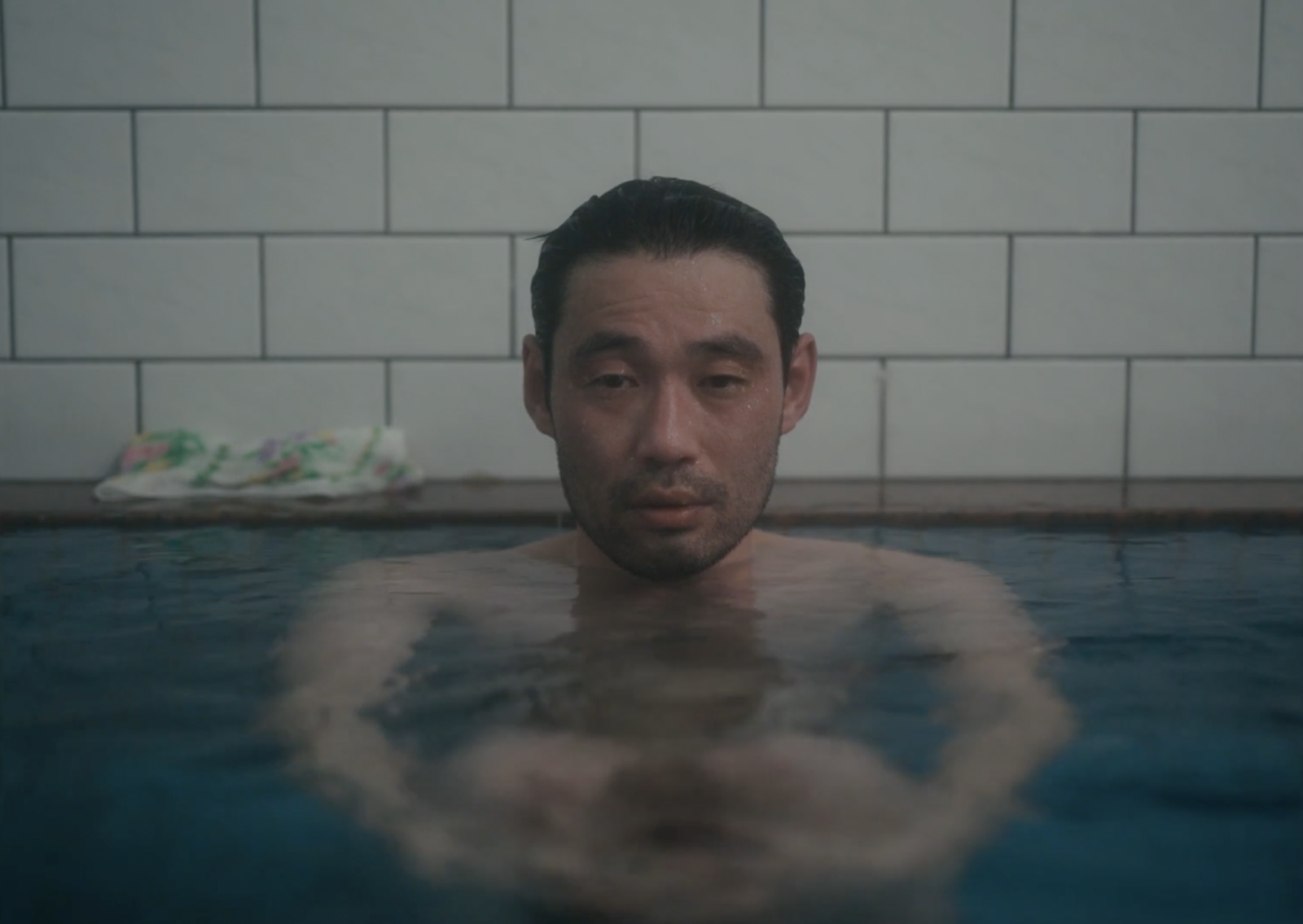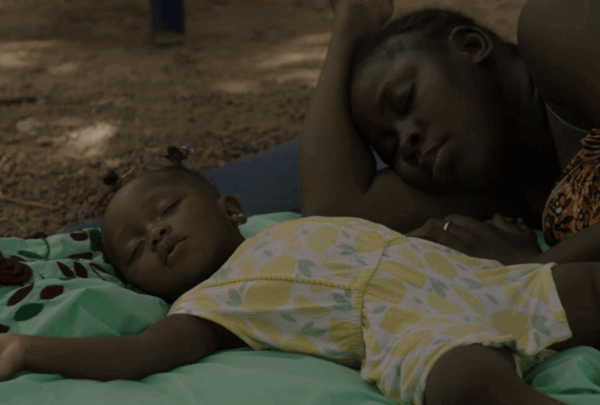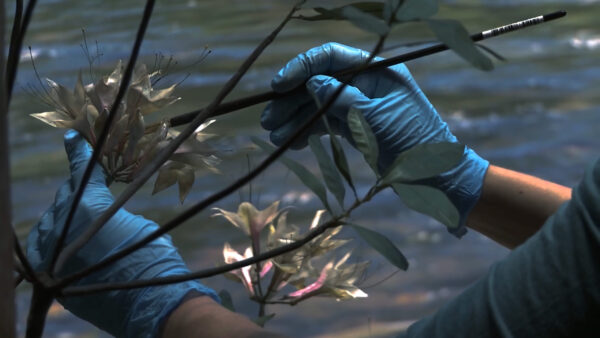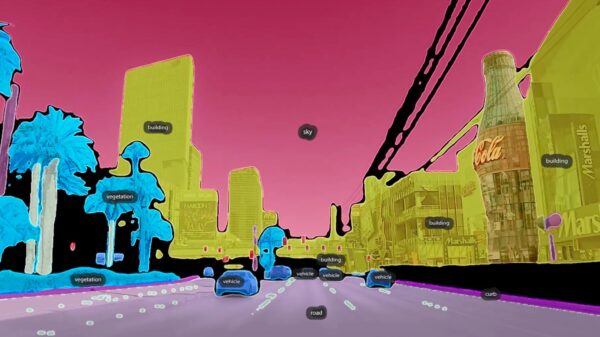Last Rites
Oyu
Elegant and deeply human, Atsushi Hirai’s Oyu is a carefully constructed homecoming haunted by loss.

A man in a winter coat awaits at the reception of a bathhouse as Japanese pop music plays in the background. It is New Year’s Eve. The owner returns with a bundle, wrapped in a stretch of flowery white cotton: a set of pastel plastic containers, shampoo, and a bar of soap lie within. The man receives it with gratitude, but his nonchalant posture betrays nothing more, his unhurried undressing even less. Only at the end of this Franco-Japanese film do we understand that these simple bathing accessories are in fact articles of grief. It is a powerfully understated opening that sets the delicate yet precise tone of the story that follows.
Figured as a raucous house of lost souls in Miyazaki’s Spirited Away, Japanese sentō are usually quieter affairs, where people of all classes and genders come in search of the solace provided by a good soak. Whatever shame or pain the body holds can be released in the succession of pools and washes, while old friends and new acquaintances are entrusted with secrets that would become gossip if shared elsewhere.
Born and held with warm water, the sentō is a forum of public intimacy, and Oyu aptly draws on this reality. Within a warren of wet rooms, the film unfolds first as a tender human comedy of nakedness: old men soap each other’s backs, laughing and chatting as their buttocks are reflected in steam-coated mirrors. Amid this all, our lone protagonist listens and observes, washing himself with the retrieved bathing accessories, but otherwise happy to retreat into a passivity that allows the chorus of bathers around him to shine. And when old friends meet, talk turns to grandsons, heartaches, and lost loved ones.
As eavesdropping becomes the film’s narrative mode, we gradually realise that none of these conversational details is benign. Indeed, each word or gesture echoes back to our enigmatic main protagonist, whose self-effacement is due to a more melancholy truth. Attentiveness and imagination are accordingly required to join the dots in what is perhaps a good example of the Japanese concept of yohaku, whereby the spectator is left to complete the blanks and ultimately compose the story.
Detailed sound design lends every movement and object within this small wet world its due weight, and the framing is as precise as the series of white tiles that line the walls. Yet although nothing is overthought or overwritten, give in to the seductive compositions for a second too long, and you risk overlooking some other morsel of narrative; it is as though the eye is pitted against the ear in the search for meaning, and more than one viewing may be required to make full sense of things. Unless, of course, this is simply a side-effect of a film whose main character titters on the edge of sleep…
Within the sudden quiet of the bathhouse, drowsiness overcomes our hero. His arms folded around his knees, he seems like an overgrown child, lost in the thoughts induced by the pool of hot water. Until a bathing companion pulls him out of his reverie. Spotted earlier amid the ageing bathers, this stranger can’t help but attract our attention: vivid tattoos adorn the entirety of his back and parts of his torso, singling him out as a member of that most recognisable of mafias: the Yakusa. Yet this elderly man displays more curiosity than threat, and with a couple of helpful questions, spells out the nature of the elusive main character in more detail. We learn he is from Tokyo, here staying at his mother’s house. “Your mother,” the Yakusa finally says, “take care of her.” And then, in a brief flash of frontal nudity, this mysterious, advice-imparting stranger is gone.
Half-way through a narrative of emotional undercurrents, nostalgia arises. A bather breaks into song, mirroring the voice of a female singer that flitters in from the reception television. “My son, where are you?” the voices intone. In the silence that follows, the ghost that has hovered over the film takes a more definite shape, and we gradually understand that this is a homecoming haunted by loss. A thousand-yard stare settles in, and with a slight slouch of the shoulders, the character’s burden is conveyed with beautiful restraint by Okihiko Yoshizawa, the only professional actor in a cast otherwise composed of amateur locals.
Back at the reception, the bathing bundle is back in its cotton sheath. Lost in the contemplation of refrigerated drinks, our man is once again lingering behind until a plea for help resounds: an elderly woman has fainted from the heat, and nobody is home, not even her son. He walks her home, the pace of their nightly footsteps aligned until her doorstep. But even as she disappears into her home, he stays back, watching her behind the glass, on the verge of tears. Under the falling snow and lonely lampposts, his journey takes on an allegorical quality until, with the click of an electrical switch, the harsh reality returns.
Barely anything remains in his mother’s house. Amid the folded cardboard boxes, one lies open on the discoloured tatami. He places his mother’s bathing bundle within it and seals the box shut. A sense of deep loss overcomes us, and we are left to wonder whether his goodbyes have been left too late.
Smart, elegant, and deeply human, Oyu is a carefully constructed cinematic tale and, in reminding us of what to keep and when to let go, proof of art’s rare power to console.





There are no comments yet, be the first!